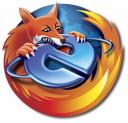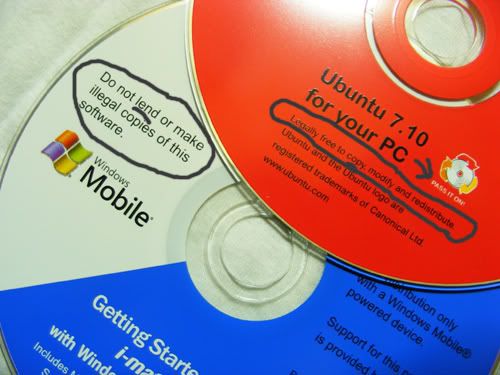I'm talking to you, potential user. You've used Windows almost all your life. You think you know a little bit about computers. Maybe you know a lot... about Windows computers. Thought you'd give the most popular distro on
DistroWatch a chance, eh? Well, let's see if Ubuntu's the right choice for you.
HardwareFirst of all, keep in mind that any OS will have its hardware limitations. People have endless arguments about why Linux doesn't support absolutely everything. It does come close, but there are some gaps. I know that wireless can be a toughie. I've heard Lexmark printers are almost a no-go. I'd say in the vast majority of cases, you'd be surprised at how much Ubuntu does recognize without any configuring, but you may end up with too low a screen resolution or something.
General distro rule of thumb: if the distro doesn't recognize more than two of your hardware pieces (say, the internet, sound, and screen resolution), you've got the wrong distro. Don't fight it. You can if you want to, but it'll be frustrating. Just get a new distro. I tried Ubuntu and only my screen resolution was off. I tried Mepis, and it recognized everything.
SoftwareThere are many
Linux equivalents for Windows software, but not for everything. Some Windows programs can be run in Linux with some helper applications, but some programs are just hopeless. Find out. Ask questions. If you think you have some Windows-only programs with no Linux substitutes, pop a question into a forum, "I use Macromedia Shockwave. Is there a way to get this working in Linux?" Don't expect too much (Linux can't run everything Windows has), but don't expect too little either (Linux often has more variety, and some programs are even better in Linux), especially if you have money for Cedega or Crossover Office.
InterfaceCan you copy and paste instructions? I mean literally copy... and paste? You can't? You hate the command line? You'd never want to even touch the command line once? You don't have any frends who are willing to install Ubuntu for you? Okay. If you answered no, no, yes, yes, and yes to those questions, then Ubuntu is not for you. You're probably better off with Mepis or Linspire.
If, however, you embrace the command-line
just for setting up Ubuntu you'll realize it's easy to copy and paste stuff that people tell you to type in, and that once you've got things set up, you can graphical user interface most of the regular programs (email, internet, etc.).
Free PriceDoes the lack of having to pay for something (software, OS, or even shipping) appeal to you? Maybe Ubuntu is for you. A lot of other Linux distros will be free but have a more up-to-date edition you pay for, or some subscription that gives you a little more. Ubuntu is free, free, free--no money for anything. Of course, if you want to donate and you have the money, go for it.
Free SoftwareThe software is also not proprietary. In practical terms that means you don't have to enter an activation code or limit how many computers you can install the software on. And if you're a programmer, you can even modify the code. However, you should realize that a lot of what you consider "basic" may, in fact, be proprietary. If you want Java support and MP3 support and DVD codecs right away, and you're not willing to copy and paste some simple commands to get them up and running, Ubuntu is not for you. Blag and Mepis have some pretty good out-of-the-box proprietary formats support.
CommunityUbuntu's community is amazing. We even put up with trolls and Linux-haters. You'll find the vast majority of users here are knowledgeable, supportive, responsive, and patient. There are a lot of HowTo's as well and some
good links.
Not WindowsDo you want an OS that's Windows without the spyware? Linux isn't for you.
Linux is not Windows. Linux can perform tasks that Windows can perform and even more, but it is not Windows. If you can't come with an open mind to Linux, then don't come at all. It's kind of like going from Windows to Mac. There's a learning curve. If you don't have time to learn, just cough up some money for anti-virus and learn more about securing your Windows computer. I've done it. It's not that hard.
I know this generally sounds like a downer. I say use Mepis. I say use Windows. I say something may not work, or you may have to do a lot of copying and pasting to get something working. I just want to warn you. I don't want you to come in with weird expectations about Ubuntu. Please don't twist what's basically a marketing slogan ("Linux for Human Beings") to mean that just about anyone can actually install Ubuntu on any computer and not have to learn anything to get it working. You can't even say that about Windows. If you want to complain about the first thing that goes wrong, don't even bother, because I know you'll complain even if nothing goes wrong. You have to have a positive attitude.
However, if you can get past all that and say, "Yes, I do want a free OS. I don't mind copying and pasting a few commands in the beginning. I want something stable and a little bit different. I don't mind learning things and being part of a supportive and fun community," then dive in! The water is nice. Ubuntu can be a wonderful experience.
P.S. - try it out
You don't have to reformat your hard drive to give Ubuntu a try. There's a live CD that won't affect your Windows installation (From the Ubuntu CD case:
Note that a Live CD is much slower than the fully installed Ubuntu system, but allows you to test Ubuntu without affecting your existing software). You can also set up a dual-boot whereby you can choose whether to boot into Windows or Ubuntu.
P.P.S. If you don't have internet access (or have dial-up and little patience with hours of downloading), then please don't use Ubuntu. Software installation and updates will be painful if not impossible.
P.P.P.S. Other distros that include popular proprietary stuff and more graphical tools "out of the box" are PCLinuxOS, Linux Mint, and Sabayon.







